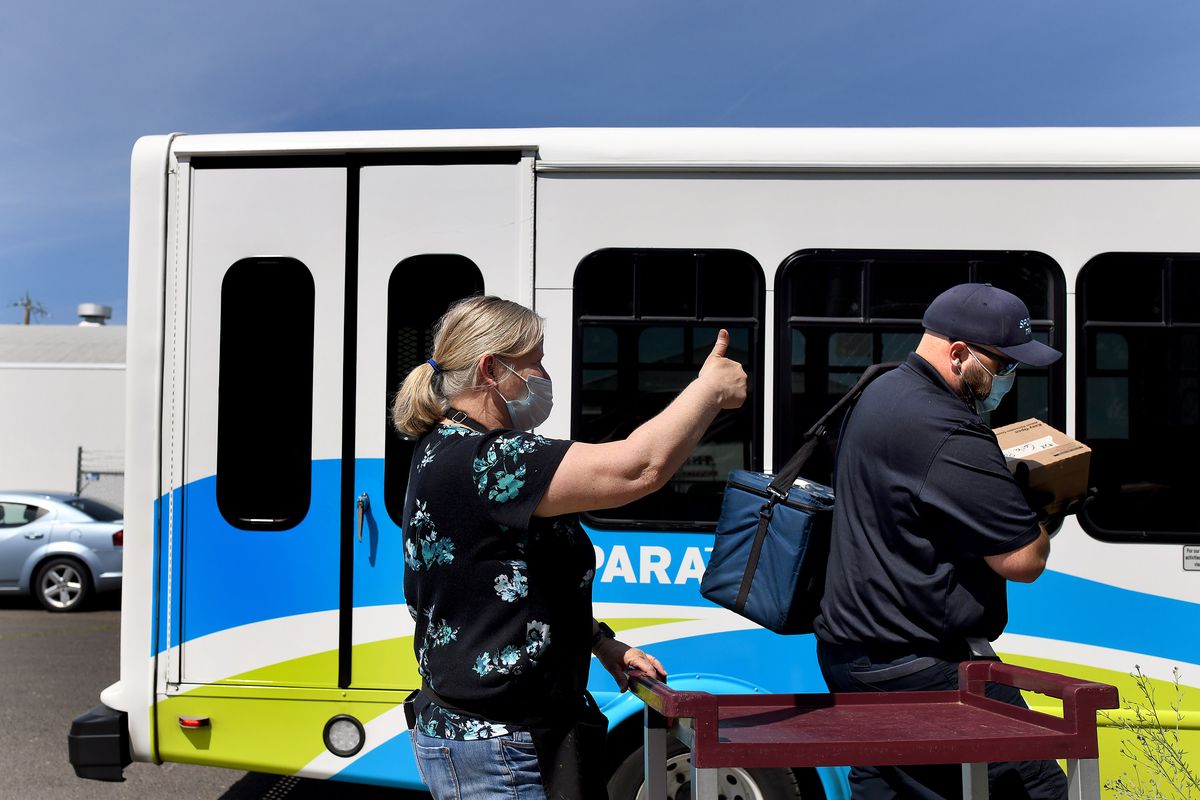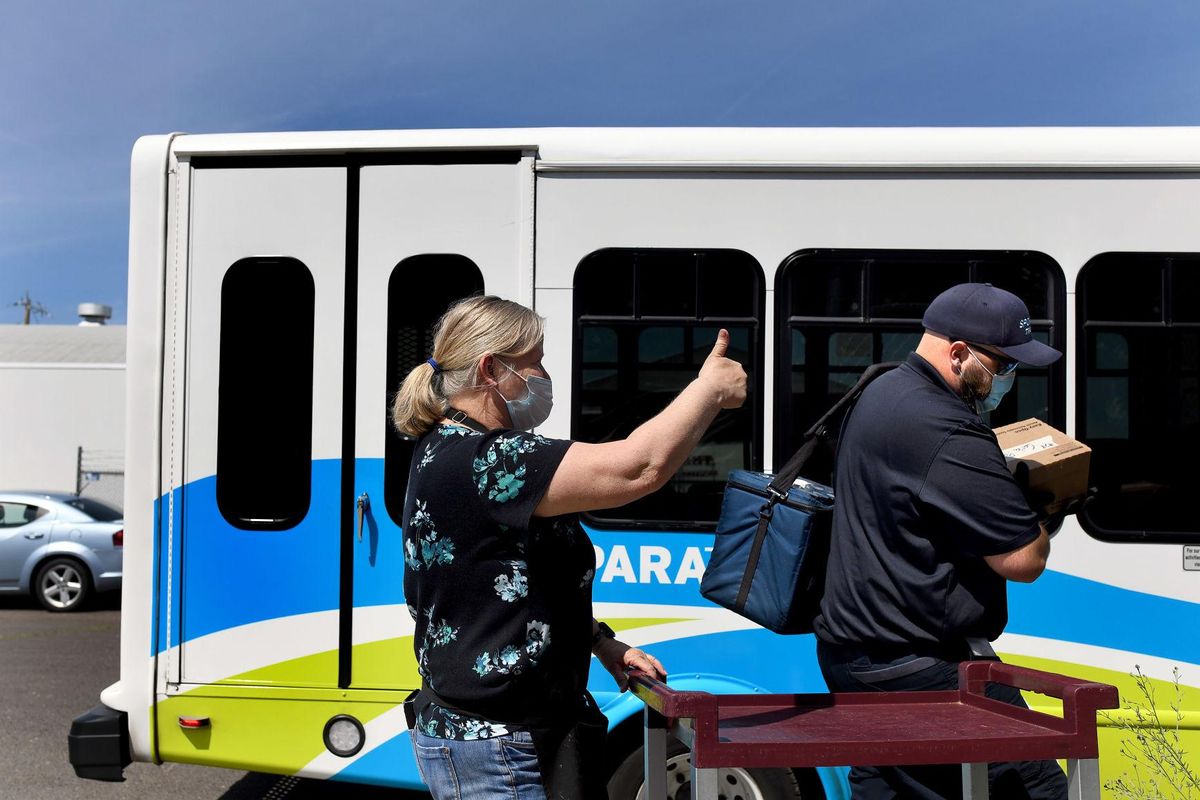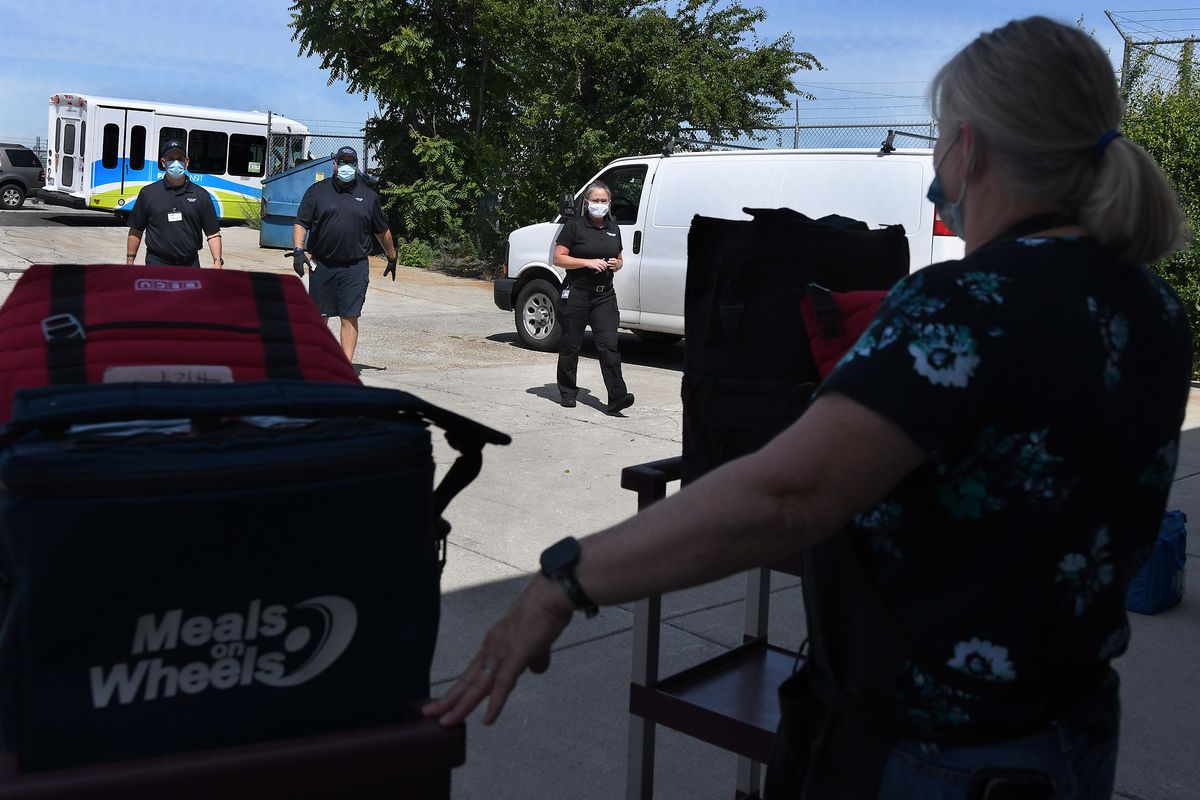Senior Meals on Wheels program handles increase in demand
STA paratransit drivers, from left, Bryan Dornbos, Alex Henry and supervisor Angela Brown walk toward food service director Jerri Horton of Greater Spokane County Meals on Wheels to help with delivery on June 25. (Kathy Plonka/The Spokesman-Review)Buy a print of this photo
When more seniors sheltered in place due to regional COVID-19 cases, Greater Spokane County Meals on Wheels saw a 25% rise in demand for deliveries of nutritious food.
The program normally provides more than 16,000 hot meals each month to residents ages 60 and older countywide, but that number increased rapidly within a month this spring, said the organization’s executive director, Jeff Edwards.
“Over about a three- to four-week period with the onset of COVID in April, we grew about 25% pretty much instantly,” he said. “That took us from serving about 16,700 meals a month to over 21,000 meals, and that was home-delivered.
“That’s pretty substantial because we also closed our congregate locations (with statewide orders), which are 12 locations throughout the county where seniors come together and eat in a group setting and for socialization.”
Edwards said the program managed the surge in meals because of partners such as Aging and Long Term Care of Eastern Washington that provides federal funding for senior nutrition. Spokane Transit Authority also offered several weeks of its paratransit vans and drivers to help cover the extra deliveries. A few STA paratransit drivers were still helping as of late June for some routes, Edwards said.
A majority of additional requests during April and May were “new intakes” to receive five to seven meals a week at their homes, he said. “They were seniors who largely were afraid to go out; they were afraid to go shopping, and they relied on us to deliver those meals.”
Seniors are among groups at the forefront of COVID-19 risk, Edwards said. He credits the program’s public-private funding model and community partnerships that allowed it to adapt and keep seniors healthy in their homes.
He said the program absorbed all new delivery requests without any waiting list. The higher demand subsided in June. “We were able to keep so many of our seniors still in their homes, still safe. They didn’t have to go out for groceries. We were able to deliver some groceries and some toilet paper.”
Edwards said ALTCEW provides the program’s seed money and boosts the value of private dollars for direct impact. As a social services agency, LTCEW serves a five-county area to help seniors and people living with disabilities stay in their homes. It has contracted with Greater Spokane County Meals on Wheels since 2011 for seniors’ home-delivered and congregate meals at Silver Cafes.
ALTCEW’s senior nutrition funding comes from the Older Americans Act, funneled to the state, then to the regional agency. With that funding mechanism in place, ALTCEW also directed newly approved emergency federal dollars to the Meals on Wheels program. The measures included Families First Coronavirus Response Act, as well as some CARES Act funding.
Edwards said the ALTCEW funds are crucial as a base of support.
“Because of our contract with ALTCEW, we serve everywhere; we don’t turn anyone down regardless of where they live in Spokane County,” he said. “They seed us with public dollars, and we go out and raise private dollars. Even prior to COVID, our public-private partnership with Aging and Long Term Care of Eastern Washington meant I could take 91 cents out of every private donor dollar and put it directly to the mission of meals.”
Meanwhile, the public funding helped with recent capital needs due to the surge, such as buying more freezers.
Private donations also increased during April and May, he said. Extra volunteers turned out as well. For several weeks, the meals program pivoted to delivering multiple frozen meals for residents to heat up later instead of daily hot meals Monday through Friday and one frozen for the weekend. It’s since gone back to the hot meals.
“When the crisis was at a peak, we switched for about three or four weeks from daily hot meal delivery, where we knock on the door and deliver one meal individually, to a weekly delivery of seven frozen meals,” he said. “That was to minimize contact between volunteers and clients during the peak. Now we’re back to daily hot meals.”
The initial ramp-up with frozen meals worked because of STA’s support, he said.
“The only reason we were able to pull that off was Spokane Transit Authority dedicated I think between eight to 10 of their paratransit vans and drivers to help us do that massive food lift operation. STA is still helping us with a few routes.
“It really was the whole community coming together and rallying around this cause – volunteers, STA, corporate donors, private donors.”
The partnering work shows the program is “geared up for the next wave, if COVID comes back in the fall, so that no senior has to go hungry,” he said.
Edwards said more volunteer delivery drivers are needed as the focus on peak demand has subsided. The program is still offering no-contact delivery, usually with the volunteer backing away at the door and then setting the food on the table at a distance but still making eye contact to ensure clients are OK, he said.
Lynn Kimball, ALTCEW executive director, said the rise in demand for senior meals was paralleled in communities nationwide as seniors and people with chronic health conditions were advised to stay home because of higher risk for developing more serious complications if they contract COVID-19.
“When you have to shelter in place so quickly, especially as an older person, it can really put a lot of people at risk for food insecurity because it was no longer safe to get out of your house,” Kimball said.
“I’m thankful we have these networks in place and funding available to help people get that nutrition and support so they can stay at home. I’m always impressed by the Spokane community and how everyone came together, how quickly Spokane Transit Authority stepped up to do meal delivery during the height of the need.
“We weathered it a lot better, I think, than other communities because people are so willing to band together.”
She said to reach seniors previously served at congregate meal sites, there’s a new pilot program through Greater Spokane County Meals on Wheels called Diner’s Choice. It’s working with restaurants for eligible seniors of former congregate sites or with demonstrated need to redeem coupons for takeout meals.


